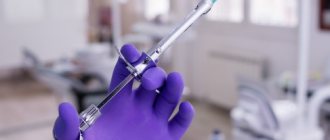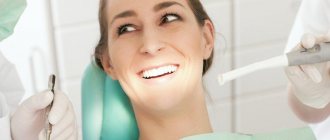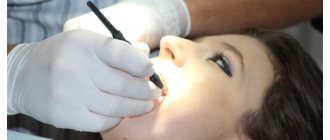During pregnancy, the expectant mother needs to listen more carefully to her body. Oral problems during pregnancy are not uncommon. Teeth and gums react very sensitively to changes occurring in a woman’s body; enamel is more susceptible to destruction and can react sharply to environmental influences. Many women think that dental treatment during pregnancy is impossible. In fact, dental treatment during pregnancy is an important and necessary procedure. After all, the condition of the teeth and the unborn child largely depends on the condition of the mother’s teeth.
Dentist consultation during pregnancy
You will need to consult a dentist more than once during pregnancy. It is better to visit the dentist in the first weeks of pregnancy so that, if there are any inflammatory processes in the oral cavity, they can begin timely treatment. It is very important to visit a dentist in the last trimester of pregnancy. At this time, the child’s skeleton and teeth are forming, so right now it is important to carefully monitor the mother’s health.
The teeth of the expectant mother are exposed to some dangers more than those of other patients. During pregnancy, a woman's appetite increases, nausea occurs, and the composition of saliva changes - its acidity increases. All these are favorable factors for the development of bacteria that have a destructive effect on the surface of the teeth.
Choose a clinic based on reviews, don’t go to the first one you come across. It is not so much the proximity to home that is important, but above all the qualifications of the dentist and experience in dental treatment during pregnancy. In our Dentistry clinic on Shchelkovskaya Diamed you will be provided with a full range of services for dental treatment during pregnancy. Don't worry about anything, just make an appointment by calling 8 (495) 033-00-63 or via the Internet by filling out the online appointment form. We are located a 7-minute walk from the Shchelkovskaya metro station at Shchelkovskoye Shosse, building 44, building 5. We work seven days a week.
Where to treat teeth during pregnancy
During pregnancy, you should definitely see a dentist. This will help avoid problems with tooth decay and prevent the moment when urgent treatment with anesthesia is necessary.
Don't be afraid to treat your teeth during pregnancy, especially if recommended by your doctor. Properly selected treatment does not harm the baby in any way, but, on the contrary, supports the normal development of the fetus and the health of the mother.
Prevention and emergency dental treatment during pregnancy is carried out at the EliteDental M dental clinic. Goal: to identify and eliminate diseases of the oral cavity in order to reduce the risk of possible complications during pregnancy.
Come for a free consultation at the EliteDental M clinic, undergo an examination and receive free treatment under the compulsory medical insurance system or for a small amount compared to other private dental clinics.
You can make an appointment with our dentists by leaving a request by email or by calling +7 (988) 544-63-54 (3 Zhdanova St.) and (6 Mironova St.). Or sign up online by submitting an application using the form below.
Dental treatment during pregnancy
Timely dental treatment during pregnancy is a guarantee of peace of mind and the absence of unnecessary emotional worries. Toothache itself is unpleasant and causes some discomfort. And toothache during pregnancy is doubly unpleasant, as it puts extra emotional stress on the pregnant woman and her unborn child.
Pregnant women are susceptible to a number of oral diseases that can develop during pregnancy due to a lack of beneficial microelements and insufficient oral hygiene. These are the diseases.
- Gingivitis is inflammation of the gums. Accompanied by a feeling of itching in the gums, pain when eating, and then bleeding. Treatment of gingivitis must be carried out necessarily, since if the disease is ignored, gingivitis quickly “flows” into periodontitis.
- Periodontitis is a complex inflammation of the tissues surrounding the tooth. Characterized by the formation of gum pockets and loose teeth. Periodontitis can result in tooth loss. Periodontitis is dangerous for the proper development of dental tissues in an unborn child, so treatment of this disease is mandatory.
- Caries. During pregnancy, the expectant mother's teeth are very susceptible to harmful bacteria, so caries develops at a rapid pace. Untreated caries can be passed on to the baby, so you need to see a dentist. In this case, dental treatment during pregnancy is mandatory.
- General weakening of gums and teeth. Due to a lack of vitamins and microelements, pregnant women experience weakening of tooth enamel, acute tooth sensitivity and bleeding gums when exposed to mechanical stress. In such cases, again, it is necessary to consult a dentist to exclude the possibility of developing oral diseases.
The danger of toothache
Expectant mothers, fearing the negative effects of medications on the baby’s body, endure toothache. They do not take medications to relieve it and do not go to see a doctor because they are afraid of the dentist using anesthesia. There is also an opinion that dental treatment is dangerous for pregnant women; it is better to wait and treat teeth after childbirth.
These judgments are erroneous; if a woman suffers toothache, she can cause enormous harm not only to her body, but also to her unborn baby. What are the dangers of toothache?
- Acute toothache due to pulpitis or periodontitis indicates the presence of purulent inflammation, which can spread to the periodontal tissues or enter other organs through the bloodstream. Odontogenic periostitis, peri-maxillary phlegmon, sepsis are conditions that can threaten the life of mother and child.
- The addition of even a minor purulent infection requires the prescription of antibacterial drugs, which also harm the unborn baby.
- After childbirth, postpartum sepsis may develop, the cause of which is a sore tooth.
- Teeth deteriorate quickly during pregnancy, so if you endure the pain and do not see a doctor in time, the question of tooth extraction may arise. Carrying out this operation increases the risk of infection entering the body through the hole; Also, removal is unnecessary stress for the patient.
- Constant pain weakens the nervous system of a pregnant woman and affects the intrauterine development of the child: the likelihood that the baby will develop abnormalities in the functioning of the cardiovascular, nervous, and endocrine systems increases. Painful stress can cause premature birth.
- If the cause of toothache is non-dental diseases, failure to see a doctor can lead to unpredictable consequences for the body.
How to treat during pregnancy
During pregnancy, it is allowed to have teeth filled and even have them removed. Dental fillings during pregnancy are carried out according to the standard procedure. Modern materials from which fillings are made do not cause any harm to either the mother or the child.
Painful procedures, including tooth extraction, are performed under local anesthesia. The anesthetic drug is chosen very carefully. The dentist must be familiar with the timing of pregnancy and contraindications in order to select the drug that is most suitable for a particular patient.
X-rays should be taken very carefully during pregnancy. If you cannot do without it during dental treatment, then it is best to take the photo in a modern dental clinic with equipment that meets high international standards. To further protect the woman and fetus from X-rays, the chest, pelvis and abdominal area are covered with a special fabric during the X-ray.
Dentists say that it is best to treat teeth during pregnancy in the second trimester. This is a period of relative calm between the critical points of pregnancy in the first trimester (when the fetus is just beginning to develop) and in the third trimester (when the fetus is almost fully formed).
Safe anesthesia for pregnant women
Dental treatment during pregnancy is carried out under local anesthesia. Painkillers that have a low impact on blood vessels are selected. However, any anesthesia that enters the mother’s blood is transmitted to the fetus, since during pregnancy they have a single circulatory system. The baby has its own circulatory system from the moment the umbilical cord is cut, until this moment it depends on the mother’s body. When anesthesia is administered, the fetus becomes lethargic and sleepy, which affects its development.
The decision on the use of anesthesia, as well as the choice of the drug itself, is made only by the doctor based on the individual characteristics of the woman’s body and the duration of her pregnancy. The doctor will definitely ask a number of questions: about the presence of past and chronic diseases, about operations performed, allergies, etc. Based on the answers received, the doctor will make recommendations for treatment.
What dental treatment is prohibited during pregnancy?
When treating teeth during pregnancy, you need to know what is strictly prohibited for expectant mothers.
As a substance for local anesthesia, it is prohibited to use those compositions that contain adrenaline and any of its derivatives. General anesthesia during pregnancy is also strictly prohibited.
Teeth whitening is prohibited. Dental prosthetics cannot be performed. It is prohibited to perform dental treatment using arsenic during pregnancy. Dentists are aware of all the restrictions and your task, in case your pregnancy is short, is to warn the doctor about pregnancy before starting dental treatment.
Prevention of toothache during pregnancy
The best way to prevent the disease is high-quality prevention. Toothaches during pregnancy are no exception. To minimize the risk of their occurrence, you must follow a few simple rules:
- Ensure proper oral hygiene (brush your teeth 2 times a day, morning and evening);
- Timely treatment of caries - treatment of the initial stages of caries without the use of anesthesia, causes minimal discomfort to the patient and prevents the development of the problem;
- Follow a proper diet - your diet should include fermented milk products, as well as foods high in calcium;
- Taking vitamin complexes is recommended by a doctor.
Do you have any questions or need help from a specialist? Contact the managers of the AlfaDent dental clinic and feel the care of professionals!
Treatment of caries during pregnancy at Dentistry on Shchelkovskaya
Finally, we will tell you what the main feature of visiting a dentist during pregnancy in our clinic is. The fact is that a pregnant woman is often subject to changes in her emotional state, so our dentists show sensitivity and attention to the patient’s condition, protecting her from any kind of physical pain and emotional stress. The dentists of the clinic on Shchelkovskaya perfectly understand the specific health and emotional background of a pregnant woman, so they do everything in their power to make your visit to the doctor calm and pleasant.
The most important thing that you should not do during pregnancy is to ignore toothache and allow the development of oral diseases. Remember that your baby’s health depends on your vigilance. Therefore, even if you feel slightly unwell, or have periodic aching pains, do not tolerate it, make an appointment with a dentist now! Treatment of caries during pregnancy at any stage of development is possible in our clinic. We work seven days a week, located in the Eastern Administrative District in the Izmailovo district at Shchelkovskoye Highway, building 44, building 5. Near us are Golyanovo, Pervomaiskaya, Partizanskaya, Cherkizovskaya.
Causes of toothache in pregnant women
Cases where before pregnancy there were practically no dental pains, but during pregnancy dental problems appeared are not uncommon. The phenomenon is caused by changes in the body during the development of the embryo inside it. There are several common causes of pain during pregnancy:
- Decreased immunity. The fetus requires a lot of vitamins and minerals. When a woman does not consume enough vitamins and minerals during pregnancy, her immune system deteriorates, since most of the small dose of nutrients is spent on the development of the fetus. Women with weak immunity are susceptible to dental diseases, since the body does not fight pathogenic bacteria in the oral cavity well.
- Increased acidity of the oral cavity. Acidity increases with toxicosis. An acidic environment is unfavorable for teeth and gums.
- Calcium deficiency. Calcium is a substance that the fetus needs. With its help, bone and other tissues are formed. If a pregnant woman does not get enough calcium into her body, the condition of her teeth will worsen, as the fetus “takes” the necessary dose for its development.
Toothache can be caused by decreased immunity
Important! During pregnancy, not only do new dental problems appear, but existing diseases also worsen. If before conception there were dental diseases that were not cured, during pregnancy they can make themselves felt.









